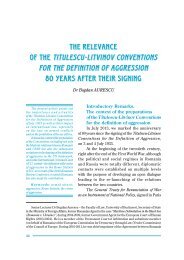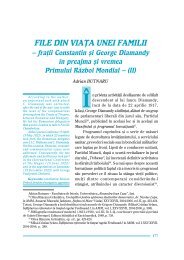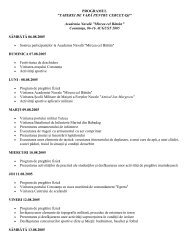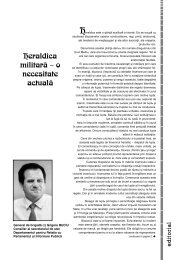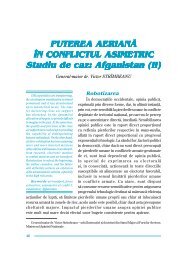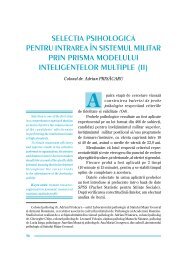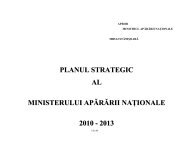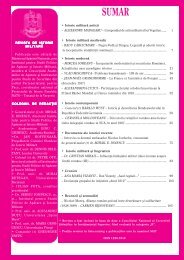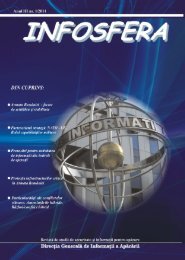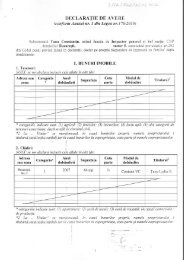Create successful ePaper yourself
Turn your PDF publications into a flip-book with our unique Google optimized e-Paper software.
tion as well as the international guarantees of free<br />
navigation that Montreux enacts. 29 Turkey has<br />
implemented a Maritime Traffic Regulation of the<br />
Turkish Straits since 1 July 1994, in order to control<br />
transit of the Straits. This Regulation violates<br />
the Convention. The International Maritime Organization<br />
(IMO) urged caution on it in May 1994<br />
to avoid further action from Turkey. The fact that<br />
the increased traffic in the Straits causes problems<br />
and could create dangers, cannot ignored.<br />
On the other hand, if Turkey wanted to contribute<br />
positively to these problems, it could bring the<br />
matter for discussion in the IMO and ask international<br />
Community to take the necessary measures<br />
instead of trying to annul unilaterally the Montreux<br />
Convention. This was also the spirit of the IMO<br />
Legal Committee during the relevant Assembly in<br />
October 1994. Turkey though instead of modifying<br />
its Regulation, it published instructions on its implementation<br />
and not adjustments according to the<br />
Convention. Taking it into account during its Assembly,<br />
the Maritime Safety Committee (MSC 65)<br />
adopted its President’s conclusions regarding the<br />
navigation through the Straits following the IMO<br />
Rules and Recommendations, and pointed out the<br />
need to conform to the international law and the<br />
1936 Montreux Convention. It also advised Governments<br />
and International Organisations to refer<br />
all technical issues arising during the transit of<br />
the Straits, to the sub-Committee of the Maritime<br />
Safety (NAV) of the IMO, which is the competent<br />
body for their solution. On November 1995, the<br />
19 th Plenary Session of the IMO adopted the Regulation<br />
and Recommendations for maritime traffic<br />
through the Straits that were agreed upon previous<br />
MSCs (63 – March 1994). It confirmed that<br />
they aim to the protection of the maritime traffic<br />
and environment in the area of the Straits, and<br />
don’t influence the rights of ships passing through<br />
the Straits as these are provided by International<br />
Convention on the Law of the Sea of 1982 and the<br />
Montreux Convention of 1936. Furthermore, it<br />
mentioned that the Turkish Code of Regulation<br />
should be in full compliance with them. Following a<br />
Russian initiative, the final Resolution included a<br />
proposal for the establishment of an International<br />
Commission to observe the Turkish Traffic Regulation<br />
and the passage through the Straits. Turkey<br />
though stated that it was not sharing its right to<br />
speak on Straits. However, when unilateral acts by<br />
a contracting party of the Convention, consist se-<br />
����� Review of Military History �����<br />
rious violation of international law, cannot annul<br />
or replace international agreements. All parties<br />
believe that the status of the Montreux Convention<br />
should not be offended, especially regarding<br />
the right of free navigation under no excuse.<br />
The end of the “cold war” influenced considerably<br />
the dangers arising from the non-implementation<br />
of the status secured by Montreux. Initiatives<br />
also on its reform by those states that had<br />
reasons to ask for it were reduced, with the exception<br />
of Turkey which continues to insist but not as<br />
strongly. Nowadays, the dispute between East and<br />
West does not exist any more and the role of NATO<br />
has been redefined after the dissolution of the<br />
Warsaw Pact. At the 5 th NATO Enlargement in<br />
2004, seven new members joined the Alliance, including<br />
two Black-Sea Powers, Bulgaria and Romania.<br />
30 Last year these two countries also joined<br />
the EU. Turkey which has been a NATO member<br />
since 1952, is hopefully going to access it soon.<br />
The ties between the states interested in the<br />
Straits, are continuously getting closer and make<br />
the future look more optimistic. The basic condition<br />
though is the maintenance of the legal regime<br />
of the Motreux Convention and its strict<br />
implementation, through which peace and prosperity<br />
can be secured.<br />
1 The historical name of the <strong>sea</strong> between the southeast<br />
Europe and Minor Asia. It is connected to the<br />
Mediterranean via Bosporus and the Sea of Marmara.<br />
The name changed to Black Sea because of the bad<br />
weather which usually exists. The original name<br />
Euxeinos Pontos in the contrary means “hospitable<br />
<strong>sea</strong>”. Countries bordering it are Bulgaria, Georgia,<br />
Ukraina, Romania, Russia and Turkey.<br />
2 Argonaut expedition is a mythic trip with a ship<br />
named Argo on board of which were all the principle<br />
heroes of ancient Greece headed by Jason. Their<br />
destination was Colchis, the eastern point of Euxeinos<br />
Pontos.<br />
3 According to the introduction of the Montreux<br />
Convention: “… the Straits of the Dardanelles, the<br />
Sea of Marmora and the Bosphorus comprised under<br />
the general term ‘Straits’… “.<br />
4 Alexander in ancient Greek means “he who repulses<br />
fighters”. His father’s name was Philippos,<br />
meaning “friend of horses” and his mother’s one Olym-<br />
67



